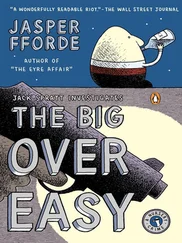The MiP exchanged glances.
“It has come to our attention,” said the taller of the two,
“that someone’s been waving the real Thursday Next’s Jurisfiction shield around. That person used it to get out of Poetry an hour ago. Were you in Poetry today, Miss Next?”
I wasn’t supposed to be there, so the answer had to be no. “No.”
They stared at me. “The officers involved told us that someone of your description had a robotic butler in the trunk of a taxi. Do you still deny this?”
I looked at Sprockett, who stared impassively ahead.
“There are probably hundreds of robotic manservants in Fiction,” I replied, “and all of them are technically luggage. But since automatons are incapable of misstatements, why don’t you ask him yourself?”
They did, and Sprockett could answer without lying that he had absolutely no knowledge of the trip at all.
“Perhaps it was Thursday herself,” I suggested. “Have you asked her?”
There was, perhaps, a subtle change in the Plaids’ demeanor. But if she was missing, as I supposed, they weren’t going to let on.
“How about Conspiracy?” asked the smaller Plaid. “We have a report from Elvis561 that someone looking a lot like Thursday and holding her Jurisfiction shield rescued a mechanical man from stoning.”
“That was definitely me,” I said. “I was on JAID business.”
They both stared at me. It was highly uncomfortable.
“Then you did have her shield?”
“I used my JAID shield. Here.”
I passed it across, and they stared at it. It was nothing like a Jurisfiction shield.
“The Elvis must have been mistaken,” I continued. “There is a certain degree of inbuilt hyperbole to the genre that might generate outrageous claims, wouldn’t you agree?”
I stared at them intently as I tried to read their expressions, but their emotionless construction made them impossible to penetrate. They probably didn’t do well at singles bars but would doubtless be able to play poker at tournament level.
“Very well,” said the first Man in Plaid. “We will leave you for now. One more thing: A call to Thursday Next at Jurisfiction was traced to this book not ten minutes ago. Was there a reason for this?”
“I have a new understudy,” I explained. “I thought Thursday might like to give her a few tips on how to play her. If you see her, will you pass my message along?”
“We’re not messengers,” said the second Plaid, and they left without another word.
There followed a moment of silence. I had just lied to the Men in Plaid, which was illegal, and even if they thought I was telling the truth, my being on their radar was probably not conducive to good health. But one thing that did cross my mind was this: If Thursday was missing, the Men in Plaid had been ordered to find her, and they didn’t yet know of the connection between me and the red-haired gentleman.
But I didn’t have any time to muse on it further, as I heard the Read Alarm go off. Somewhere in the Outland, a reader had picked up one of my books. Luckily for us, things can happen instantaneously in the BookWorld, so I dashed through to the kitchen to find Carmine already dressed and ready to go. I half thought of taking over, but I had to let her give it a whirl sooner or later.
“It’s barely teatime in the Outland,” I said, glancing at the clock. “Someone must be taking a break. Are you ready?”
Carmine nodded.
I turned to Mrs. Malaprop, who was monitoring the progress of all the readings on a circular screen that plotted in word-for-word detail which readers were where, and in what book.
“It’s a slope oak,” she said. “ Lost in a Good Book, page 133, SpecOps Twilight Homes. I’ll contract Granny Next.”
She flipped a switch on the intercom, and her voice echoed around the series on the intercom.
“Hear this, hear this. Would Granny Next please pro-seed Toe-wads TN2, P133.”
“An easy scene,” I said, turning to Carmine. “How’s your Ping-Pong?”
“Not bad.”
“It doesn’t matter. Granny Next will crush you anyway.”
“What is a ‘slope oak’?”
“She means ‘a slow poke.’ It’s what we call readers who’ve been working their way through the series at a snail’s pace. When they falter—which they often do—you should try to alter your dialogue for simplicity. You’ll feel their ReadRate increase when you do, and we aim only to help. The reader is everything, yes?”
She looked up at me and bit her lip nervously.
“The reader is everything,” she repeated. “But you’ll step in if there are more then twenty concurrent reads, won’t you?”
Being read simultaneously was often described as like trying to visit everywhere in Paris at the same time during rush hour. The simile was lost on me, but I made a point of never wanting to visit Paris, real or imaginary.
“Don’t worry,” I told her, “you’ll be fine. We’ve got at least four hours before the other readers come onstream. Take a deep breath and repeat the first person’s credo: ‘Pace, Atmosphere, Plot, Prose, Character.’”
“Pace, Atmosphere, Plot, Prose, Character.”
“Good. Give them hell.”
And she gave me a wan smile and headed off towards the SpecOps Twilight Homes, which were cemented just between Thornfield Hall and the interior Skyrail set. With an odd feeling, I watched her go. I liked the time off, but I liked being Thursday, too—even if it was to an audience of only one.
“Here,” I said, passing the Snooze access codes to Mrs. Malaprop. “Keep a close eye on her.”
“This is a last resort, yes?” asked Mrs. Malaprop, who licked kittens probably more than most.
“Last resort. Call me and I’ll come running.”
I walked out of the kitchen. There was work to be done.
Maps of the BookWorld are constantly updated as the genres snake back and forth in response to Outland trends and fads. The borders move so rapidly, in fact, that any notion of a fully updated map is considered laughable, and most maps are these days published with average borders that reflect reading trends of the past ten years.
Bradshaw’s BookWorld Companion (3rd edition)
Despite the unwanted attentions of the Men in Plaid, the warnings from the red-haired gentleman and the worrying possibility that Thursday might be missing, I spent a busy and anxious afternoon going through the heap of book junk in the garage. I was, to be honest, torn. Part of me wanted nothing better than to accede to Red Herring’s wishes that this be an “unrepeatable” accident, and part of me was suspicious. The closer I examined the book junk, the worse it looked. It appeared that something, while not exactly rotten in the state of the BookWorld, was far from fresh.
At a little after five, and with a rising sense of foreboding, I called Sprockett into my study to compare notes.
“So what do you have?” I asked, letting him air his discoveries first.
He led me across to where the Atlas of the BookWorld lay open on my desk. He indicated the page that depicted the southeastern part of the island and showed me where he had plotted the crashed book’s debris trail by a series of black crosses. Most sections of text would have pulverized into graphemes and simply absorbed, which explains why we rarely find anything when short stories or limericks come to grief, just a hollow concussion in the distance.
Almost all the debris had been strewn across the Aviation genre, with the notable exception of the bed-sitting room already discovered inside Conspiracy and a Triumph motorcycle within Thriller (Spy) that narrowly missed George Smiley as it traveled through an early draft of Tinker, Tailor, Soldier, Hatmaker . The book seemed to have disintegrated somewhere above Deighton and then strewn objects in a roughly straight line north, in the direction of the Great Library and the Ungenred Zone.
Читать дальше











![Джаспер Ффорде - Вечный кролик [litres]](/books/436518/dzhasper-fforde-vechnyj-krolik-litres-thumb.webp)
